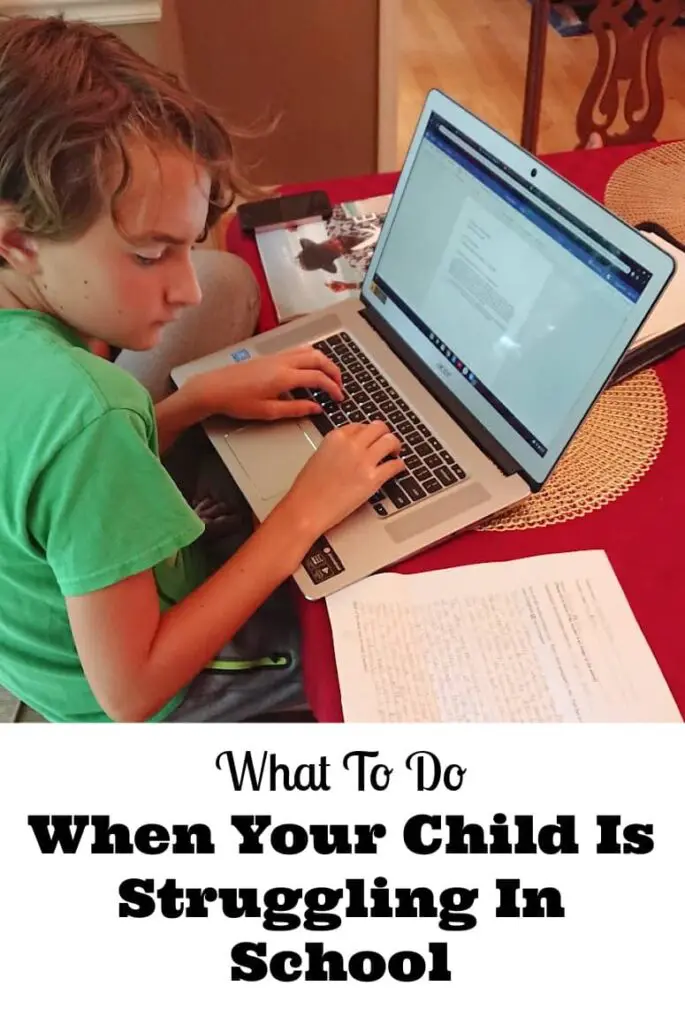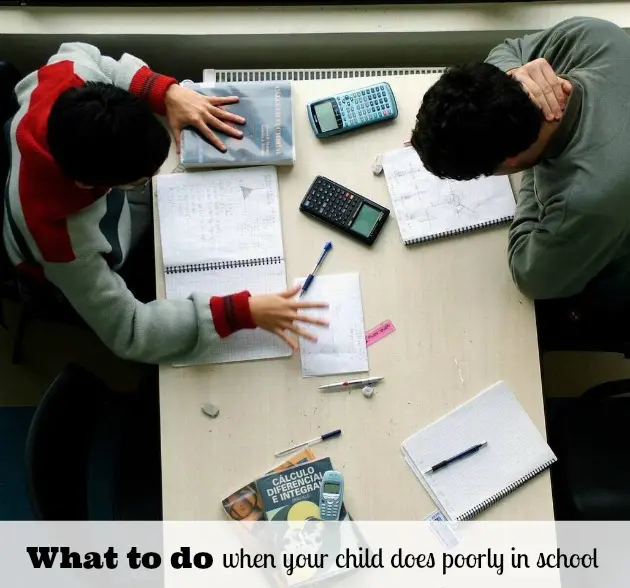Is your child struggling in school? What do you do when your child is failing or getting bad grades in school? When your child does poorly in school, it can feel confusing and frustrating. You just know, “My child is smart but not doing well in school.” If you are wondering what to do and how to handle your child failing at school, I am happy to have Zoe Evergreen to share some advice on this matter. She has lots of great ideas for how to help a child that is not doing well in school.
Zoe is a former teacher who runs a private tutoring business. When she visit homes of students who are struggling, she often comes into situations in which the parents simply cannot accept that their child has a learning “hole” or even a learning deficiency. She has learned to coach families to work together to solve problems, creating an environment in which the child feels completely loved and supported and, in return, the families are healthier and happier. Here is her advice for what to do when your child does poorly in school. She wants parents to remember, “What your child struggles with can be the best thing to happen to them!”
What To Do When Your Child Is Not Doing Well In School
Why Is My Child Getting Bad Grades?
Look for the reason why your child is struggling in school. You may want to take a trip to the pediatrician and make sure there is no health problem or eye problem that is impeding his or her performance. You probably want to think about whether you have noticed any big changes in your child and if so what may have triggered this change. Notice their mood and talk to them about their feelings. Basically, you want to first try to rule out any learning disabilities and any external stressors. You want to understand if your child feels there is a problem at all and if so what they feel may be the cause of it. This gives you some place to start.
If your teenager is failing school and doesn’t care, it is likely that they are just pretending not to care because they don’t know what to do. They may feel helpless and too embarrassed to ask for help. They may feel like a lost cause and need you to help bolster them up and provide them with a path forward.
Your Child Is Probably Not Just Lazy
“Oh, he’s smart. He’s just lazy!” As a teacher who left the classroom to run my own tutoring company, I hear this roughly a hundred times a year. In fact, in the past, I had actually said that very thing about my own kids. I have learned not to accept this at face value, knowing that there’s a whole lot of raw emotions involved with it. I have learned that the “lazy” label is not necessarily true. There is usually something else going on- some kind of disconnect or frustration.
When I walk into a home on the first day of tutoring, emotions are usually really high. The child is usually failing at least one subject and both the parent and the child feel defeated. The label, “lazy”, seems to be somehow easier to swallow than to accept their child is actually struggling in some way. Believe the best about your child and accept that it may be something else besides laziness.
Remember, Struggling Is Not Inherently Bad
Yes, your child may not be “good” at a certain subject, but this doesn’t have to be the worst thing in the world. In fact, it can be the very best thing to ever happen to your child!
Let me explain. When I was in middle school, I broke my ankle on a trampoline. In lieu of the expensive physical therapy, I was given a huge rubber band, a terrible paper copy of exercises, and sent home. (You’ve got to love the eighties.) I was told my ankle would never be the same unless I did those exercises. As you can imagine, I was pretty driven to get that ankle back in tip top condition. I relentlessly worked with that huge rubber band every single night, not letting myself go to sleep until I had finished. You know what? That ankle is the strongest part of my entire body now.
What you work on and give your strength to becomes an asset. It can be this way with your child’s struggling academics as well. In fact, I barely passed Geometry in high school and now I teach it! I took extra classes in college and I worked on it very hard and now I teach kids who are struggling the same way I did. That puts me at a gracious perspective because I understand firsthand the struggle.
I’m sure there has been something you struggled with. I’m not sure why we expect our children to be any different. In fact, it makes for a much better person. In his article in Psychology Today, Jim Taylor, PhD, writes “Because everything comes so easily to them [students who never struggle], many never learn the skills—hard work, persistence, patience, perseverance, discipline—that will enable them to become truly successful.” So, this thing that your child is struggling in can be their saving grace- if you handle it right.

Love with Grace
When our children are born or put into our arms from adoption, this overwhelming love floods over us like we have never experienced. In fact, if you think about it, with every other person you love, there is a reason you love them. I love my husband because he is kind, generous, and intelligent. I chose him. Those attributes were on “My Perfect Man” list I made when I was ten. Thankfully, I didn’t make a “Perfect Child” list when I was ten. Sure, there are attributes that I love about my children, but even if they didn’t possess those things, I would still adore them.
Your child did nothing to deserve your love in the beginning and they shouldn’t have to earn it now.
Grace is actively loving a person without them having to qualify for that love. Are we giving our children performance based love? Are you putting too much emphasis on their academics? It is not good to send them the message that we are only happy with them when they are successful. Are our family lives a mess because we are yelling at our children to perform?
I hope those questions didn’t hit you as hard as they once hit me. Too often, I have witness tremendous family turmoil because a child was not succeeding in an area. So, how do you have a healthy, loving, grace-filled relationship with your child when they are not doing well academically?
Put Emotional Health Before Academic Performance
As kids, we used to get report cards every nine weeks and interim reports every four weeks. Those were nerve racking days. My stomach was in knots and I dreaded peaking at my grades. But with technology today, we can see our child’s grades every single day. I’ve seen parents checking their child’s grades every few hours, more addicted to the grade portal than to Facebook.
How would you feel if your boss was constantly checking your performance? “I see today you typed 140 words a minute, but yesterday it was 160. Why are you slipping? Are you paying attention to what you are doing? Were you socializing instead of working? It sounds like you’re just lazy!” I would give you a week before you quit.
The emotional health of your family is truly the most important thing. Your relationship with your son or daughter will last a lifetime, Algebra 2 will not. It’s time to stop nitpicking and start supporting. Eat dinner together, laugh and have fun as much as possible as a family. There are so many fun activities to do with your child, no matter what age. We build relationships with our children by our experiences with them. Try not to yell if you see their performance slip. It is up to you to set the tone for your home.

Support Their Academic Studies
Your child’s grades not so good? That’s great! When you child does poorly in school, you can come around him as a family and support him. This is an opportunity to show your child that you are the soft place to land. They should be keenly aware that when they are in trouble, you are the person to go to. That doesn’t mean you do their homework for them and pat them on the head and say, “Don’t worry, Daddy will take care of it.” Quite the opposite.
Put your arm around them and tell them you understand. Tell them a time you struggled with something. Tell them that hard work will be the ticket. They need to know that they can do it. What you are breathing into your child now will be the voice inside them forever.
If you understand the material, work with them calmly. If you have an older child who has taken the class, have them sit with their sibling at night and help. You may want to pay the older sibling a little for tutoring , if their attitude is good. If you have no one in the family that can help, hire a tutor. Asking their teacher for a name of a tutor is a good place to start as is interviewing college kids you may know.
I know a professional tutor can be expensive, but for goodness sake, sell something, take a little side project to earn money, or give up cable television up for a while. Don’t allow your child to feel guilty about your sacrifice, either. Help them to know they are more important than any thing. People are more important than things. Certainly, your child is more important than anything. I will tell you something, when you are gone, these are the things they will remember.
Ask for an IEP
I am always taken aback when parents don’t know what this is. IEP stands for Individualized Education Plan. This is a contract with you and your child’s teacher(s) that states your child’s difficulties and how the faculty will work with you and your child.
If your child is in public school, this is a big deal and it will be handled immediately. When your child does poorly in school, call their guidance counselor or teacher, very nicely state what’s going on, and get a meeting set up right away. If your child is in private school, there are still things your child’s teacher and administration can do to help your child, it just won’t be a legally binding contract.
Both of you should be there for this meeting (meaning you and your partner). If you can’t do that, take someone with you (in particular your child’s tutor) who will also remain calm and take notes for you. Do not gang up on the faculty. Your child should not be in this meeting. Everyone should feel like they can openly talk.
IEP’s are wonderful things because they put everyone on the same team. Don’t be scared of them. These are used for super geniuses as well. Einstein would have had an IEP. They are just there to make your child’s education more individualized to their needs.
Is homework taking hours and hours to do? Ask for abbreviated homework assignments. Does your child understand the material, but does poorly on written tests? Ask if the teacher would be willing to give the test a different way. Teachers are very creative and can and will find a way to help your child succeed.
Be upfront about anything else going on at home so the school faculty understands the toll that other factors are having on your child. A child can only learn when his or her emotional needs are being met first. Get everyone on the same page and ask for the support your child needs.
Anytime there is a meeting about your child, it is a very emotional thing. Try to remember that the teachers sitting before you are doing this because they love their students. Know they are on the same team as you.
Do not tell them what you think they are doing wrong or what your child has come home telling you they said. You don’t tell a surgeon how to do their job because you had surgery once. You shouldn’t tell an educator how to educate because you were once a student. This IEP meeting is not the time to vent. I promise you 99% of teachers are doing their very best. Your child’s lack of success probably isn’t anyone’s fault at all.

Conclusion For When Child Is Doing Poorly In School
We, as parents, cannot look at our children as trophies. They are not perfect, they are not without hardships (thank goodness), and they are definitely not mini versions of us. This is the time they are looking to us to see how we deal with difficulties. They are going to eventually mimic that- good or bad.
It’s time to believe the best of our children. They want to succeed, even if they are failing. They also want to be loved with grace and not by their performance. When your child does poorly in school, rally behind them and cheer them on. When they get bad grades, offer them the support to improve. Let them know that hard work will help them achieve their goals and you believe they can do it.
Related Posts:
Study Skills High School Students Need To Know


Leon Scott Baxter says
I have been a parent for fifteen years, but a teacher for eighteen. So you might think that in my mind, a child’s success is determined by his academic progress. And, you’d be right…when I’m wearing my “teacher hat” (a velvet green number with a tassel). But, when I don my “daddy hat,” (a fedora-like thing with a feather) I realize there’s more to success than school. Help your child find their passion- something they enjoy and can succeed at doing. Success builds confidence, which leads to working harder which brings her back to more success, a wonderful success-confidence-academic cycle which will make everyone pleased.